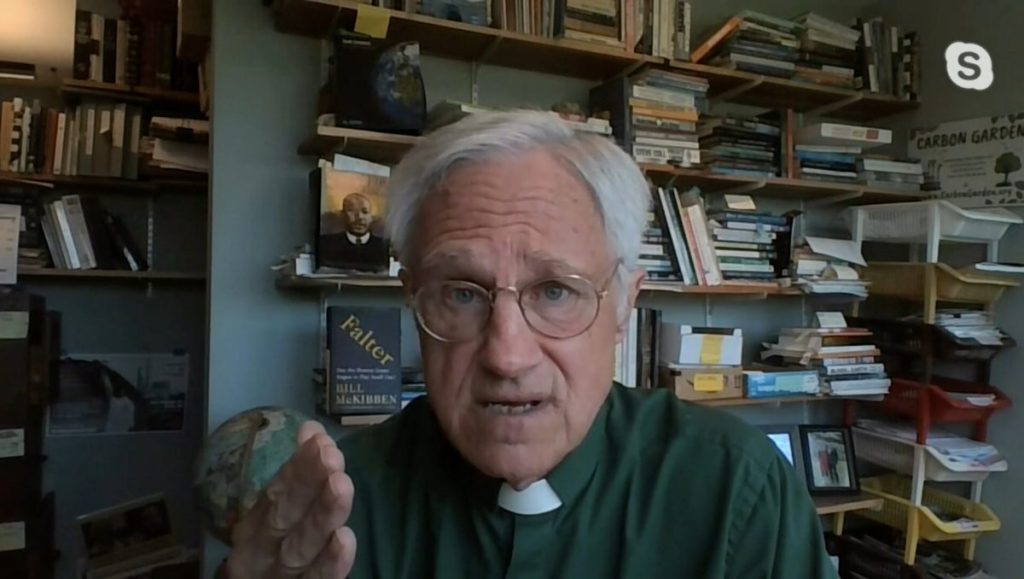
As Americans’ acceptance of the overwhelming science of climate change grows, only 9% view climate change as a religious issue. But Jim Antal said that congregations and people of faith have a responsibility to preach and act on the current crisis with urgency in his lecture, “God’s Call — Our Vocation — In a Time of Climate Chaos.”
Antal took up the Interfaith Lecture Series mantle for Week One’s “Faith to Save the Earth” on Thursday, July 2. Antal’s lecture nearly replaced Randolph Haluza-DeLay’s previously scheduled Monday lecture following a cancelation, before a system-wide shutdown moved Antal back to his original time slot.
Antal serves as Special Advisor on Climate Justice to the General Minister and President of the United Church of Christ. Previously, Antal led the state of Massachusetts’ 350 UCC churches as their Conference Minister and President. In 2013, he proposed the UCC to be the first to divest from fossil fuels, and the resolution passed.
Early in his lecture, Antal said that climate change is an intersectional issue.
“Climate change multiplies and accelerates injustice in at least three ways,” Antal said.
Black, indigenous and poor communities are the most greatly affected by climate change throughout history and the present day, suffering the consequences of the exponentially larger carbon footprints of the rich. However, he said the United States is not willing to pay reparations to these communities, while annually subsidizing fossil fuel companies with over $20 billion a year with taxpayer money.
Antal also said that there is intergenerational responsibility to change systems currently in place, so financial investment and government policy will no longer support practices that are technically legal while damaging the environment and communities.
Referring to the Biblical story of Esther, who had to disobey the secular king to save her people from annihilation, Antal said the shared calling — which he asked individuals, congregations and all of humanity to consider and take action — should upend the status quo if done right.
Paraphrasing the popular quote from Esther 4:14, Antal said, “Perhaps our generation was born to put an end to these injustices.”
To achieve this over multiple generations, religious leaders play a role by using their platforms and speaking out against injustices. He read passages from his book, Climate Church, Climate World, which detail how religious leaders acted throughout history — or didn’t, as when Christian bishops failed to respond to the rise of Nazi Germany.
Antal also called for a sense of urgency, using examples of secular leaders from the present and the past.
In 1941, President Franklin Delano Roosevelt asked Edsel Ford to stop making cars and instead use his factory for World War II efforts. In six months, the Willowrun Complex started churning out a new B-24 Liberator bomber every 24 hours.
“If the alarm of World War II can prompt the largest industry in America to willingly and urgently redirect its resources and change its business plan, then it’s up to our generation to muster the courage that climate change requires of us to create the new story,” Antal said.
Antal is a supporter of the Green New Deal, he said, because that proposal has courage, a sense of urgency, and the correct scale to address climate change — which, as an enormous problem, needs equally enormous solutions.
Antal had countless suggestions for religious leaders, congregations and anyone who wants to take action, with an emphasis on addressing economic causes of climate change on both the supply and demand sides.
Antal proposed the UCC’s 2013 decision to publicly divest from fossil fuel companies, the first religious organization to do so. At the time of the decision, he said he received calls from countless financial advisers telling him it was impossible to have a balanced portfolio without fossil fuel companies.
Since 2013, fossil fuel companies have lost $14 trillion in investments after the UCC decision prompted members of the church to pull those companies out of their stock holdings. And Antal said financial advisers now offer between 20 to 30 renewable energy alternatives for investors who are concerned about their investments’ effects beyond their finances.
Antal said campaigns can be executed by secular leaders and concerned citizens as well, and gave specific examples. Actor Jane Fonda, who has publicly protested on behalf of the climate and other issues, announced that she would cut up her J.P. Morgan Chase credit card if Chase Bank didn’t stop lending to fossil fuel companies, and encouraged others to do the same.
Chase Bank, which has lent $268 billion to these corporations since the 2015 Paris Agreement, cut off the companies and set aside $50 billion for lending to green projects.
Antal said individuals could run similar campaigns by calling offices of their senators and congresspeople, asking how much campaign donations they accepted from fossil fuel companies, and using their leverage as voters and taxpayers. Callers can specifically threaten to not vote for policymakers next election if they don’t end subsidies to the fossil fuel industry, and prioritize boosting wind and solar energy.
Antal said that religious leaders should normalize social disobedience as another way to serve religious values. He cited the time that Jesus’ disciples Peter and Paul spent in jail after Jesus died on the cross.
“They were serving the church of the future,” Antal said.
Antal’s lecture was pre-recorded on June 22 in Antal’s Vermont home. The lecture’s release, while interrupted sporadically by technical problems, was completed in its original time slot, and a live Q-and-A still took place. Audience members could submit to the www.questions.chq.org portal and through Twitter with #CHQ2020.
Antal answered questions in front of the same background of a wall of books that he recorded his lecture in. He also wore the same green liturgical robe which is traditionally worn during the season after Pentecost to symbolize growth in the church.




